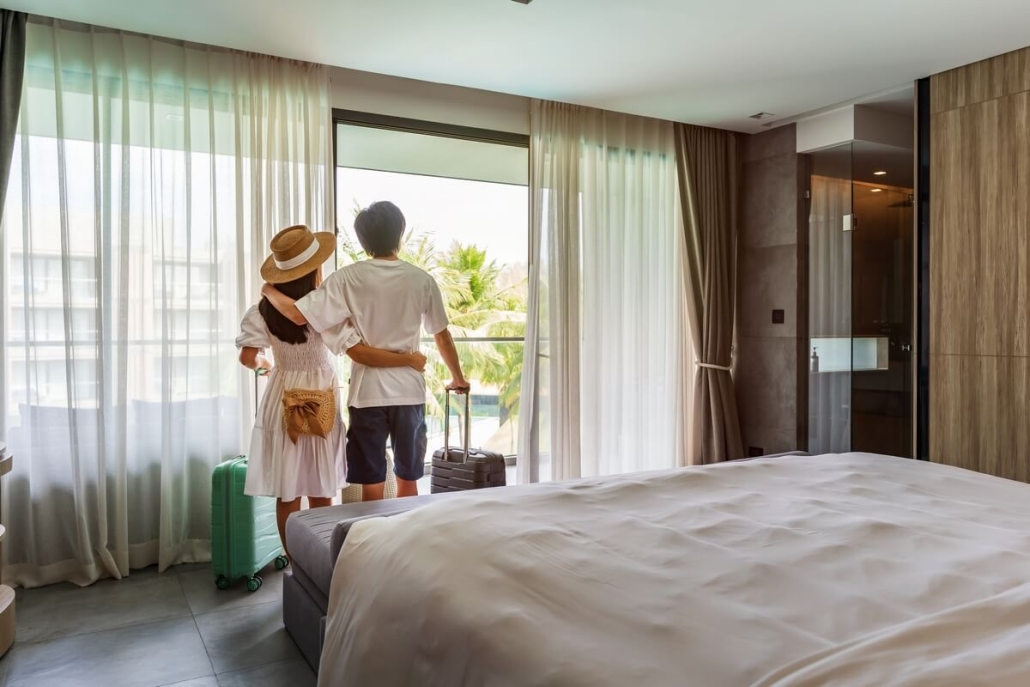Airbnb Red Flags: How to Spot Problem Guests Before Booking
Running a successful short-term rental business is about more than creating a stylish and comfortable space. It also involves attracting the right type of guests and ensuring each stay runs smoothly from booking to check-out. While the majority of travelers are courteous and appreciative, a few can create unnecessary stress or even cause costly problems. Recognizing Airbnb Red Flags before confirming a booking is one of the smartest ways to protect your rental business.
An experienced Airbnb management partner like MasterHost can make this process far easier. With a proven guest screening system, round-the-clock communication, cleanings and maintenance coordination, and years of hosting expertise, MasterHost helps property owners identify potential issues early, minimize risks, and keep occupancy high without the day-to-day hassle.
Read about Are Airbnb Management Fees. What Hosts Pay For.
Why Identifying Airbnb Red Flags Matters
When you welcome guests into your property in Canada, you are trusting that they will respect your space, your neighbours, and local bylaws. Unfortunately, overlooking potential Airbnb Red Flags can lead to preventable problems such as property damage, noise complaints to municipal authorities, or disputes over payments.
In recent years, Airbnb has strengthened its global safety measures, including anti-party technology designed to automatically block high-risk reservations during major celebration dates such as New Year’s Eve, Canada Day, and long weekends. These efforts have reduced party-related incidents significantly in many markets. Still, technology alone cannot eliminate all risks, human judgment remains essential.
The most successful Canadian Airbnb hosts combine a warm, welcoming approach with firm boundaries. They use a mix of intuition and consistent screening techniques to evaluate booking requests, reducing risks while keeping occupancy rates strong year-round.
Airbnb’s guest review system, identity verification tools, and in-platform messaging are valuable resources, but they are most effective when paired with the host’s own due diligence. By learning to recognize the patterns and behaviours of Airbnb problem guests, you can make informed decisions and maintain a stress-free hosting experience.
Explore Reasons for Airbnb Claim Rejection.

Common Airbnb Red Flags to Watch For
These warning signs don’t always mean a guest will cause problems, but they should prompt you to look closer before confirming a booking.
Airbnb Red Flag #1: Incomplete Profiles and No Reviews
A profile with no photo, missing personal details, or zero reviews is one of the first Airbnb red flags. New users aren’t automatically bad guests, but the absence of a verified history means you have no track record to reference.
If such a guest is also vague in communication, you should be extra cautious. Ask for additional details, such as the reason for their trip, who will be staying, and whether they’ve read your house rules. In 2025, many experienced hosts also ask for confirmation that the booking is for the person on the account, not a friend or relative, since identity misuse has become a more frequent issue.
Airbnb Red Flag #2: Last-Minute Booking Requests
Same-day or next-day bookings can be genuine. Think flight delays or unexpected business trips, but they can also signal higher risk. Guests intending to throw a party or break rules sometimes book at the last minute to avoid detailed screening.
Airbnb’s latest anti-party system flags some of these reservations automatically, especially if they involve one- or two-night stays by local guests. Still, you should ask specific questions before accepting, and require written agreement to your rules through Airbnb’s messaging system.
Airbnb Red Flag #3: Avoiding Direct Questions
Good guests have no problem explaining who they are and why they’re booking. If a guest avoids answering direct questions, changes their story, or gives inconsistent details, it’s a clear Airbnb red flag.
For example, if someone says they’re visiting for work but hesitates when asked for their employer’s name or conference details, that’s a sign you should dig deeper. Transparency builds trust. Lack of it suggests possible hidden intentions.
Airbnb Red Flag # 4: Large Groups for Small Spaces
When the number of guests doesn’t match your property’s capacity, you should investigate. If your listing accommodates four people but a request comes in for six or more, there’s a higher risk of noise, damage, and neighbor complaints.
Overcrowding also raises safety concerns, from fire hazards to excessive wear on furniture. Some hosts in 2025 have started requiring exact names of all guests before accepting bookings to prevent “extra” visitors from showing up unannounced.
Airbnb Red Flag # 5: Requests for Off-Platform Communication
Airbnb advises hosts to keep all communication within its platform. Guests who ask for your phone number, email, or want to pay outside Airbnb are raising a major red flag.
Off-platform contact removes the protections Airbnb offers, like dispute mediation, secure payment handling, and cancellation safeguards. It can also indicate attempts at scams or policy violations.

Airbnb Red Flag # 6: Ignoring or Resisting House Rules
Before booking, most responsible guests will read the house rules carefully. If someone asks for exceptions, such as smoking indoors when your listing is smoke-free, it can be a sign of trouble.
A 2024 Airbnb host survey found that guests who questioned multiple rules before arrival were twice as likely to receive negative reviews for behavior. Respect for rules starts before the stay.
Airbnb Red Flag # 7:. Overly Demanding Behavior Before Booking
Some guests reveal difficult personalities during the booking process. Excessive messaging, unreasonable requests, and insistence on early check-in or late check-out without willingness to compromise can foreshadow challenges.
While flexibility is part of good hospitality, bending too far for high-maintenance guests often leads to more stress and potential disputes.
Airbnb Red Flag # 8: Suspiciously High Interest in Security and Access Details
It’s common for guests to ask where the keys are located or how to check in. But when someone repeatedly asks about your security measures, such as door codes, alarm systems, camera locations, or whether there are staff on-site, it can be a sign they are trying to assess vulnerabilities rather than plan their stay.
Experienced hosts in 2025 have reported cases where guests who over-questioned security details ended up attempting to disable cameras, tamper with locks, or bring in extra people undetected. While you should always answer legitimate safety-related inquiries, avoid revealing more than necessary before confirming a booking. Instead, let guests know you will provide full access instructions after the reservation is confirmed, and remind them that all property rules and security features are in place for their safety and comfort.
Airbnb Red Flag # 9: Multiple Change Requests Before Arrival
Most travelers occasionally need to adjust their booking, perhaps changing a date or adding a guest. But multiple modifications to dates, guest counts, or payment methods before arrival can indicate disorganization at best and fraudulent activity at worst.
For example, some Airbnb problem guests book under one set of details to secure the property, then repeatedly alter the reservation in ways that sidestep your rules or cancellation policy. Others might add extra guests after initially booking for fewer people, attempting to avoid paying additional fees.
To protect yourself, keep all changes documented in Airbnb’s messaging system, and require payment adjustments to be made through the platform. If the requests become excessive or suspicious, it’s often safer to decline the booking than risk a problematic stay.

How to Screen Guests Effectively
Recognizing Airbnb red flags is only step one. You also need a clear, repeatable screening process to assess guests confidently.
Check Reviews and Verification
Read all past reviews from other hosts, paying attention to cleanliness, communication, and respect for house rules. Guests with verified IDs and multiple positive stays are usually lower risk.
Airbnb now allows hosts to filter bookings so only verified guests can reserve instantly. Using this feature can save time and reduce uncertainty.
Use Pre-Booking Questions
Have a standard set of questions ready. For example:
- What brings you to the area?
- Who will be staying with you?
- Have you read and agreed to the house rules?
Consistent questions make it easier to spot vague or inconsistent answers, both clear Airbnb red flags.
Trust Your Instincts
If a guest’s tone or behavior makes you uncomfortable, you’re under no obligation to accept the booking. Airbnb’s policy allows you to decline as long as your decision isn’t discriminatory. Experienced hosts often develop an instinct for spotting problematic situations.
Keep All Communication on Airbnb
Messages sent through Airbnb create a record that protects you in case of disputes. They also discourage Airbnb problem guests from making risky requests, since Airbnb staff can review the conversation if needed.

How to Politely Decline a Problem Guest
Declining doesn’t have to be awkward. You can remain polite while protecting your space:
“Thank you for your interest in our property. Unfortunately, based on the information provided, we’re unable to proceed with your booking at this time. We wish you the best in finding suitable accommodation.”
This keeps the conversation professional and avoids unnecessary conflict.
Balancing Caution and Opportunity
Not every Airbnb red flag means you should reject the booking outright. Some guests are simply new to the platform or unaware of certain expectations. In those cases, additional communication can resolve concerns.
Balancing caution with an open mind helps you avoid turning away potentially great guests while still protecting your property.
Additional Tips to Avoid Airbnb Problem Guests
- Use Instant Book with Filters to allow only guests with verified IDs and positive reviews.
- Set Security Deposits to encourage care and deter damage.
- Require Government ID where legally allowed, especially for longer stays.
- Install Noise Monitoring Devices to catch potential parties early (always disclose this in your listing).
- Limit Local Bookings during high-risk periods such as New Year’s Eve or graduation weekends.
Final Thoughts to Airbnb Red Flags
Hosting on Airbnb can be financially and personally rewarding, but it comes with responsibilities. By learning to spot Airbnb red flags, you safeguard your property, your income, and your reputation.
Screening guests carefully, asking the right questions, and trusting your instincts are your best defenses against Airbnb problem guests. Prevention is far easier than damage control, and vigilance ensures smoother stays for both you and your visitors.
With the right balance of caution and hospitality, you’ll build a thriving short-term rental business that attracts respectful guests while keeping potential trouble away.












